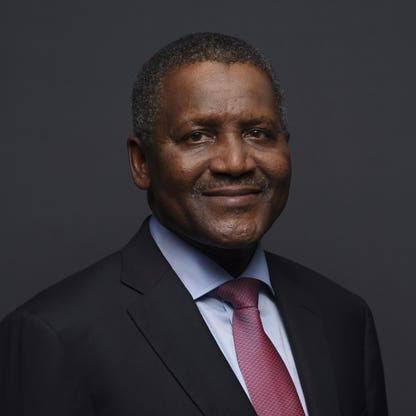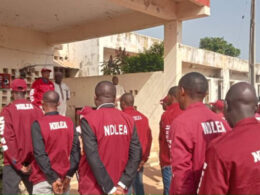Aliko Dangote is a prominent Nigerian businessman and philanthropist, best known for founding the Dangote Group, which has become the largest conglomerate in West Africa
Aliko Dangote, born on April 10, 1957, in Kano, Nigeria, is a celebrated entrepreneur, industrialist, and philanthropist. He is known as the richest person in Africa, Dangote’s success has had profound implications for Africa’s industrialization.
His business conglomerate, the Dangote Group, spans multiple sectors, including cement, oil, sugar, and agriculture, playing a crucial role in Nigeria’s diversification efforts and contributing significantly to the region’s economic growth.
Family And Education
Born into a wealthy Hausa Muslim family, Dangote grew up surrounded by commerce and trade. His maternal great-grandfather, Alhassan Dantata, was a prominent businessman who, until his death in 1955, was considered the wealthiest person in West Africa.
Dangote attended the Sheikh Ali Kumasi Madrasa for his early education, followed by secondary studies at Government College, Birnin Kudu. Afterward, he pursued higher education at Al-Azhar University in Cairo, Egypt, where he studied business and administration.
Dangote Group
In 1977, armed with a loan from his uncle, Dangote founded the Dangote Group as a small trading company focused on importing goods like sugar, cement, and rice. Moving to Lagos that same year, he capitalized on Nigeria’s growing demand for commodities. By the early 1980s, the company had grown considerably, becoming a critical supplier of essential goods across the country.
In the 1990s, Dangote transitioned the company from trading to manufacturing, expanding into sugar refining and cement production. This decision coincided with the Nigerian government’s privatization policies, which allowed Dangote to acquire key industrial assets. In 2000, the establishment of the Dangote Cement factory marked a turning point, transforming the group into a leading industrial force across west Africa.
Cement Industry
Dangote Cement is the flagship of the Dangote Group and is credited with changing the landscape of the African cement industry. The company operates in 10 countries and commands a dominant market share in Nigeria, where it accounts for more than 60% of the cement sold locally. Its facilities produce millions of tons of cement annually, reducing reliance on imports and contributing to Nigeria’s economic self-sufficiency.
The company also set industry benchmarks by adopting energy-efficient production techniques and maintaining state-of-the-art plants. Dangote Cement is listed on the Nigerian Stock Exchange, making it one of the most valuable companies in Africa. It was the first Nigerian company to join the Forbes Global 2000 list, reflecting its growing international clout.
Oil Industry
In a bold move to further diversify the company’s portfolio, Dangote embarked on the construction of the largest oil refinery in Africa. The $19 billion Dangote Refinery, situated in Lekki, Lagos, was inaugurated on May 22, 2023. Designed to process 650,000 barrels of crude oil per day, the refinery is said to address Nigeria’s chronic fuel shortages and reduce the country’s dependency on imported petroleum products.
The refinery is integrated with petrochemical and fertilizer plants, marking a significant step toward industrial self-reliance. With over 135,000 expected jobs and enhanced export opportunities, the Dangote Refinery is projected to have a transformative impact on Nigeria’s economy. Furthermore, the refinery receives crude oil through a 1,100-kilometer subsea pipeline, the longest in the world highlighting the scale of this endeavor.
Philanthropy
In addition to business success, Dangote has established himself as a leading philanthropist. In 2014, he endowed the Aliko Dangote Foundation with $1.25 billion, making it one of the largest charitable foundations in Africa. The foundation focuses on health, education, and economic empowerment, reflecting Dangote’s commitment to improving lives across the continent.
The foundation has partnered with organizations like the Bill and Melinda Gates Foundation to combat polio and malaria. During the COVID-19 pandemic, Dangote played a critical role by donating funds and medical supplies to support Nigeria’s public health response. His philanthropic efforts also include significant investments in education, aiming to increase access to quality schooling for children across Nigeria.
Expansion into Agriculture and Other Sectors
As part of Nigeria’s push for economic diversification, Dangote Group has expanded into agriculture, with operations focusing on sugar plantations, rice production, and fertilizer manufacturing. The company is a key player in Nigeria’s drive toward food security and agricultural self-sufficiency. Dangote’s entry into fertilizer production, through the establishment of a world-class fertilizer plant, has also positioned Nigeria as a potential exporter of fertilizers across Africa.
In 2022, Dangote further diversified his portfolio by launching the Dangote Peugeot Automobile plant in partnership with the Stellantis Group. Located in Kaduna, the plant aims to promote local car manufacturing and reduce Nigeria’s reliance on imported vehicles.
Global Influence and Awards
Dangote’s influence extends beyond business. He serves on several international boards, including the United Nations’ Global Education Initiative and the Clinton Health Access Initiative. His leadership and impact have earned him numerous awards. Forbes has repeatedly listed him as Africa’s richest man, and he was recognized among TIME’s 100 most influential people in 2014.
Additionally, in 2016, he was appointed co-chair of the US-Africa Business Center by the U.S. Chamber of Commerce, further solidifying his position as a global business leader. These accolades underscore Dangote’s commitment to fostering international cooperation and promoting Africa’s economic integration.
Driving Economic Growth
Dangote’s contributions to Nigeria’s economy are immense. His company, Dangote Cement, is the largest cement producer in Africa, providing critical infrastructure for development across the continent. Additionally, the Dangote Refinery, inaugurated in 2023, is set to transform Nigeria’s oil sector by reducing fuel imports and boosting exports.
In agriculture, the Dangote Group has invested heavily in rice, sugar, and fertilizer production, aligning with Nigeria’s goals for food security and reducing foreign dependency. Through these ventures, Dangote has created thousands of jobs and facilitated industrial self-sufficiency, contributing to national economic growth.
Mastering Monopolies?
While Dangote’s business success is widely celebrated, some critics argue that his dominance in multiple sectors raises concerns about monopolization. For instance, Dangote Cement holds more than 60% of the market share in Nigeria, leaving little room for competition. Critics suggest that such market control may stifle innovation and create barriers for smaller companies entering the industry. Some also point out the advantages his companies have enjoyed through government policies, questioning whether Dangote’s success stems from fair competition or preferential treatment.










Join our Channel...